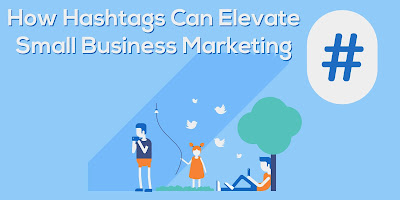Hashtags can increase impressions, boost the searchability
of your written or visual content, and motivate more people to speak about your
brand.
However, to use hashtags efficiently, you must do more than
just incorporating them into your tweets on Twitter or posts on Instagram,
Facebook or another social network.
Here’s what you must be aware of when it comes to using
hashtag marketing as part of your complete small business promoting strategy.
What is a Hashtag?
A hashtag is a content label for a specific topic. It will
help others who are curious in a particular issue, swiftly find content on that
same topic.
A hashtag appears something like this: #SmallBiz or #smallbusiness
Hashtags are implemented mostly on social networking
sites. They rose to popularity on
Twitter. But now you can use hashtags on
other social media sites, such as Twitter, Instagram, Pinterest, Facebook, and
Google+.
Anyone posting content on an important topic can include the
hashtag label to their post. Others
looking for that subject, can lookup for that label to find other information
on that very same social media platform.
For instance, throughout the movement against sexual
harassment and sexual assault, #MeToo
hashtags were used. They exhibited invaluable for sharing women harassment
issues around the world and lifted the global awareness surrounding the
difficulties women encounter in their day-to-day lives, both private and
professional.
What is hashtag marketing?
Hashtag marketing is the process of using hashtags smartly
to help get your content to a specific audience.
Selecting the ideal hashtags for a post can help in boosting
popularity – increasing your content views, likes, retweets, and shares. All of
this social actions eventually helps to give your content and your small
business visibility.
Nevertheless, not all hashtags are produced equal. And
various types of hashtags reach different viewers – completing a variety of
goals for your small business.
These are the forms of hashtags your small business should
consider and keep ready in your marketing tool case.
1)Trending Hashtags
A trending hashtag is a hashtag relevant to a popular
subject or occasion.
Creating a new hashtag and helping it expand involves more
effort than just taking part in a bigger conversation that is experiencing a
time of recognition.
Although trending hashtags can be counted on only for
short-term engagement, they are awesome for grasping the instance and
capitalizing on a temporary period of time, but extremely popular topic.
2)Niche Hashtags
Searching for ways to squeeze into hashtag marketing? Niche
hashtags for present companies, industries and fields are great picks.
Begin with searching what hashtags your contenders and
business influencers are utilizing. If you’re uncertain of how to discover
relevant hashtags, use web based tools like Hashtagify or Ritetag.
If your business functions as a specific niche community,
follow well-known influencers in that area and monitor what hashtags they use.
For instance, crowdspring helps marketers, small businesses,
companies, famous brands, and non-profit organizations with customized logo design, website
design, printing design, packing design, merchandise design, and even with
distinctive business names and product labels. When crowdspring shows content
on social network sites, we frequently add industry hashtags on our content.
3)Branded Hashtags
Branded hashtags are hashtags produced by your small
business to portray your brand.
These types of hashtags need a bit more work to get off the
surface. They count on your own marketing to build up momentum rather than
piggybacking off of a well-known popular topic or venture.
Still, generating a hashtag for your small business is
worthwhile. When done correctly, these hashtags function as a direct pipeline
for users to find content particularly relevant to your brand.
The most straight-forward edition of a branded hashtag is
your company name (#starbucks, #ikea).
Still, you can also get a chunk of creativity. Look at
examples like #EsuranceSave30 or #DigiorNoYouDidn’t.
To learn how to leverage different digital marketing channels for your business, do
visit

Comments
Post a Comment